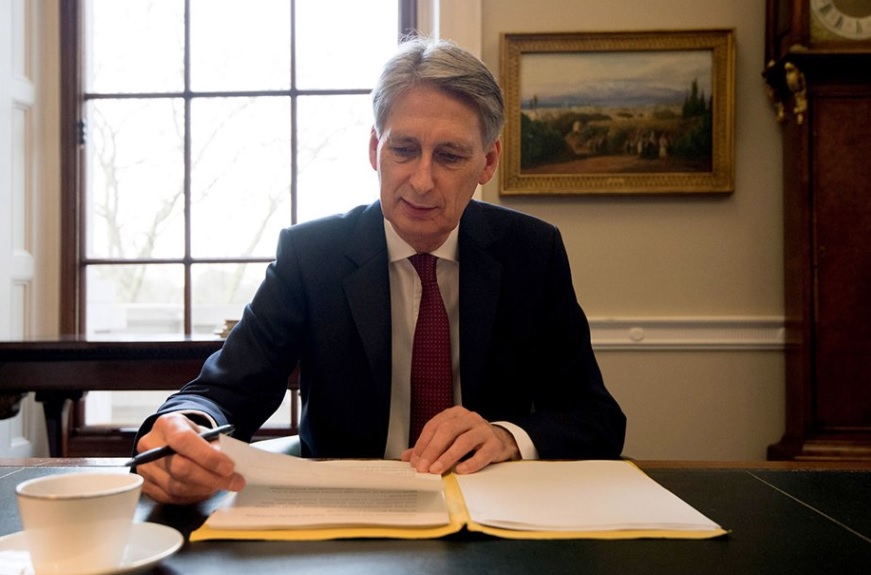The UK’s transition towards a net zero economy will cost the country more than £1 trillion, 40% more than the Committee on Climate Change has suggested, HM Treasury has claimed.
Earlier today the Financial Times reported that a letter from chancellor Philip Hammond to Prime Minister Theresa May last month claimed that the true cost of setting a net zero emissions target by 2050 would be north of £1 trillion.
The letter, since published by FT journalist Jim Pickard, addressed to the Prime Minister and dated from last month, argues that while the chancellor agrees that government must legislate for a net zero target “as soon as possible”, it is essential that it “fully considers the implications of adopting a more ambitious target” before enshrining it in law.
The letter goes on to question the Committee on Climate Change’s forecasted cost of attaining net zero emissions by 2050, stating that the £50 billion per year estimate the CCC put forward last month is 40% lower than the Department for Business, Energy and Industrial Strategy’s estimate which stands at £70 billion per year.
Without any formal clarification on the issue, it remains to be seen how the government’s own analysis differs so markedly from the CCC’s.
The Committee’s analysis was exhaustively detailed in a 256-page report last month, examining the impacts establishing such a target would have throughout the economy, but limiting costs to within 1-2% of GDP.
Within the three-page letter, Hammond suggests that while his department’s analysis places costs within the CCC’s envelope of 1-2% of GDP, it forecasts them to be significantly higher.
It also stresses the level of disruption establishing a net zero target would cause to areas such as housing, industry and transport, arguing that “significant changes” to agricultural practices would be required.
The chancellor concludes with a recommendation that the PM accept the Committee’s target, writing: “The UK has shown excellent leadership on climate change over the past decade and must continue to do so. However, in order for this radical transformation to be successful, it is essential that we better understand the implications of setting a target that will shape our economy and society for a generation, before it is set in law.”
Publication of the letter follows what has been a trepidatious week for the issue of decarbonisation in Westminster.
On Tuesday it was claimed that cabinet ministers had agreed to use flexibilities to meet future carbon budgets, an issue which has sparked strong condemnation from the CCC in the past, followed a day later by news that the Treasury select committee was to launch an inquiry into the department’s decarbonisation efforts.
It also took centre stage during yesterday’s Prime Minister’s Questions when shadow energy secretary Rebecca Long Bailey, standing in for opposition leader Jeremy Corbyn, clashed with David Lidington over the issue.
Long Bailey initially questioned whether or not the Prime Minister had raised environmental issues with repeated climate change denier and US President Donald Trump during his state visit this week, before moving on to ask why the government is off track in meeting its own, legally-binding commitments.
Lidington’s reply, that the government is “not off track” in meeting respective targets, prompted a strong rebuke from the shadow energy secretary, who raised reports from earlier this week that the government is to use flexibilities to “fiddle” with forthcoming carbon budgets and scrutinised its record on solar PV, with domestic installs having fallen 94% month-on-month following the closure of the feed-in tariff.
“How much authority do this government actually have on this issue? Three current cabinet ministers have denied the scientific consensus on climate change, and several of those standing in the Tory leadership contest have close links with organisations and individuals promoting climate denial. It does not bode well,” she said.
Lidington’s assertion that the government remains on track to meet its carbon budgets is also only strictly true when referring to the third carbon budget. In respect of the fourth and fifth carbon budgets, covering the period from 2022 – 2032, the gap to meeting those budgets is actually widening by the government’s own assertion.
The government is also still yet to confirm publicly whether or not it has taken the decision under Section 17 of the Climate Change Act to use previous over-performance in emissions reduction to offset predicted underperformance within forthcoming budgets, a move which the Committee on Climate Change has repeatedly warned against.





